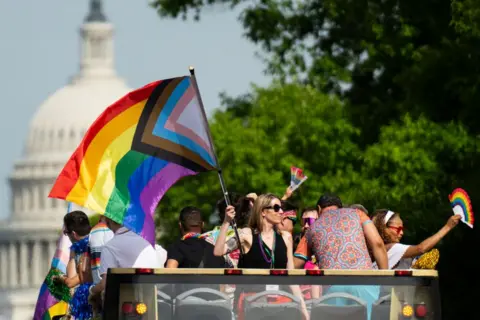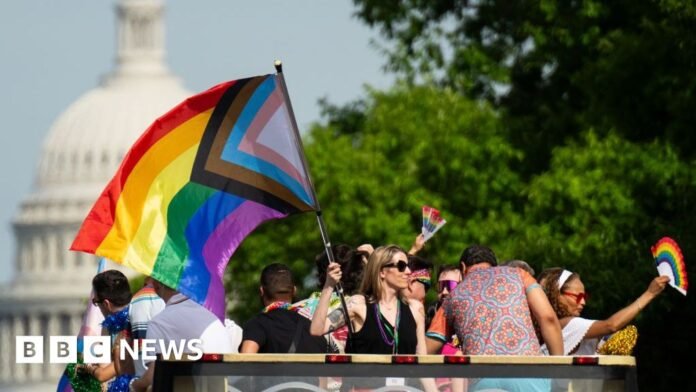BBC News
 Getty Images
Getty ImagesAcross Washington, large rainbow flags are flying next to the stars and stripes as the city plays host to World Pride, a global celebration of LGBTQ culture and identity.
But getting the world to come has proved challenging this year. Some international travellers are choosing to skip the biennial event over travel fears, while others are protesting President Donald Trump’s policies.
Alice Siregar, a Montreal-based data analyst who is transgender, had planned to attend. But travelling to the US at the moment was unthinkable, she told the BBC.
“It is a risk to now come over and especially as a trans woman,” she said.
The US capital won the bid to host World Pride years before Trump’s re-election. In January, the event’s organisers had projected the celebration, which coincides with the 50th anniversary of Washington’s first Pride march, would attract three million visitors and contribute nearly $800 million to the local economy.
But their expectations have now dropped to about a third of their previous estimates. Hotel occupancy rates are also down compared to last year.
 Alice Siregar
Alice SiregarMs Siregar, 30, holds both Canadian and US citizenship but says she has been unable to renew her US passport because of new rules implemented by the Trump administration that prevents transgender Americans from changing their gender on official documents.
The White House says it is defending “the biological reality of sex”.
She could travel south with her Canadian passport, but she is worried border agents may not accept her gender, which is listed as female on her Canadian documents. Reports of other foreign travellers being detained and taken into custody have raised her concerns, she said.
“It’s too dangerous to risk it,” she said.
A spokesperson for US Customs and Border Protection said that a person’s gender identity does not make them inadmissible.
“A foreign traveller’s gender as indicated on their passport and their personal beliefs about sexuality do not render a person inadmissible,” the spokesperson told the BBC in a statement. “Claims to the contrary are false.”
But Ms Siregar is not alone in her concerns. Several European governments including Germany, Finland, and Denmark have issued travel advisories for transgender and non-binary citizens travelling to the US. Equality Australia, an advocacy group, also issued a travel alert for gender non-conforming people and those with a history of LGBTQ activism.
Egale Canada, one of the country’s largest LGBTQ charities, said it was not participating in World Pride because of concerns for the safety of their transgender and non-binary staff. Egale Canada has previously participated in World Pride events in London, Sydney and at home in Toronto.
“We are very concerned about the general tone and hostility towards domestic LGBTI people in the US, but also to those who may be visiting the US from other jurisdictions,” its executive director Helen Kennedy said.
Trump’s repeated comments about making Canada the 51st US state was also a factor, she added. Ms Kennedy said the organisation wasn’t boycotting World Pride itself, but protesting against Trump’s policies on LGBTQ issues.
Since coming into office, Trump has rolled back some LGBTQ protections, including revoking a Biden-era executive order on preventing discrimination “on the basis of gender identity or sexual orientation”. He has also banned diversity, equity, and inclusion (DEI) policies in federal agencies. Supporters say those policies help correct injustices, but others, including Trump, say they are themselves discriminatory.
His administration has also banned transgender people from serving in the military and banned federal funding for gender care for transgender youth. It has also threatened to suspend funding for states that allow transgender athletes to compete.
Trump has defended his actions, saying trans women in sports is “demeaning for women and it’s very bad for our country”.
Some of these policies are currently being challenged in court.
This week, US media reported plans by the navy to rename a ship that had been christened to honour Harvey Milk. The former Navy sailor and activist was the first openly gay man to be elected to public office in California, in 1977.
While former President Joe Biden held a Pride month event on the White House lawn in 2023 and issued a proclomation in support of the community last year, Mr Trump has not spoken in recent days about the celebration. Asked about the president’s position on World Pride, a spokesman for the White House told the New York Times that Trump was “fostering a sense of national pride that should be celebrated daily” and that he was “honoured to serve all Americans.”
Capital Pride Alliance, the organisation running this year’s World Pride in DC, told the BBC it has recieved “an unordinary amount of questions and concerns”.
“Our celebration is quite literally in the footsteps of the Capitol Building and a block away from the White House, something that a lot of people are conscious of,” Sahand Miraminy, Capital Pride Alliance’s director of operations, said.
For the first time, Pride in DC will have an enclosed perimeter and weapons detectors, he said, in part because this year’s event will draw larger crowds than usual. World Pride events will also see an elevated presence of the Metropolitan Police Department’s LGBTQ+ liaison unit that will be “first priority” to respond to emergencies, Mr Miraminy said.
Washington’s Mayor Muriel Bowser acknowledged that visitors “feel scared that an environment is developing that is anti-LGBTQ”.
But “we can’t live in fear, we have to live our lives [and] be as best prepared as we can,” she said.
Kelly Laczko, the co-owner of Her Diner in DuPont Circle, one of DC’s most vibrant LGBTQ neighbourhoods, said she’s also increased security for the weekend.
“I feel like normally with Pride we are ready for the celebration,” she said. “And obviously the current administration has put a big damper on that.”
Although she will not be in Washington, Ms Siregar said she hopes others do visit.
“I do think that people in the US should attend and be safe in attending,” she said. “It’s important that people stand up more than ever now.”
Ms Laczko agrees. “Even joy can be an act of defiance,” she said.


